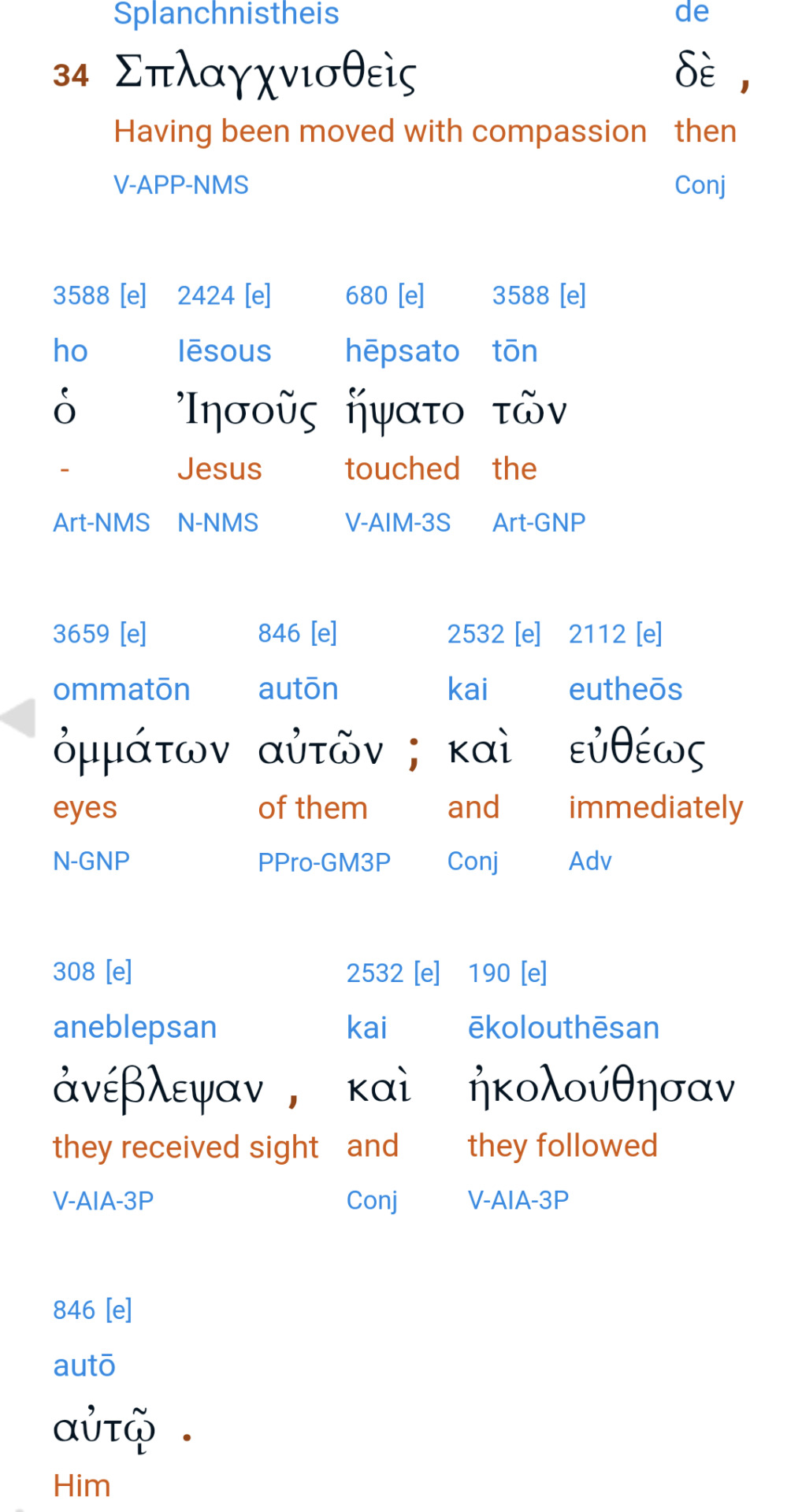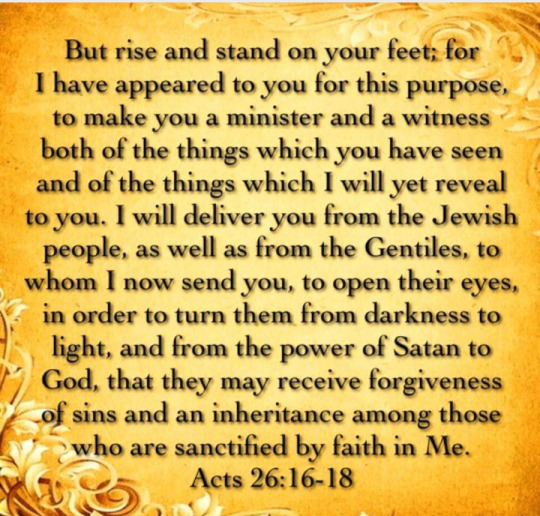#HCSB
Text

A Plea for Rescue
5 God, You know my foolishness,
and my guilty acts are not hidden from You.
6 Do not let those who put their hope in You
be disgraced because of me,
Lord God of Hosts;
do not let those who seek You
be humiliated because of me,
God of Israel.
— Psalm 69:5-6 | Holman Christian Standard Bible (HCSB)
Holman Christian Standard Bible Copyright © 1999, 2000, 2002, 2003, 2009 by Holman Bible Publishers, Nashville Tennessee. All rights reserved.
Cross References: 2 Samuel 12:14; Psalm 38:5; Psalm 44:21; Psalm 59:6
#God#guilt#help#seeking#Lord#hope#shame#sin#Psalm 69:5-6#Book of Psalms#Old Testament#HCSB#Holman Christian Standard Bible#Holman Bible Publishers
32 notes
·
View notes
Photo

Isaiah 43:2 (HCSB) -
I will be with you
when you pass through the waters,
and when you pass through the rivers,
they will not overwhelm you.
You will not be scorched
when you walk through the fire,
and the flame will not burn you.
105 notes
·
View notes
Text
KJ21
And the Lord God took the man and put him into the Garden of Eden to dress it and to keep it.
ASV
And Jehovah God took the man, and put him into the garden of Eden to dress it and to keep it.
AMP
So the Lord God took the man [He had made] and settled him in the Garden of Eden to cultivate and keep it.
AMPC
And the Lord God took the man and put him in the Garden of Eden to tend and guard and keep it.
BRG
And the Lord God took the man, and put him into the garden of Eden to dress it and to keep it.
CSB
The Lord God took the man and placed him in the garden of Eden to work it and watch over it.
CEB
The Lord God took the human and settled him in the garden of Eden to farm it and to take care of it.
CJB
Adonai, God, took the person and put him in the garden of ‘Eden to cultivate and care for it.
CEV
The Lord God put the man in the Garden of Eden to take care of it and to look after it.
DARBY
And Jehovah Elohim took Man, and put him into the garden of Eden, to till it and to guard it.
DRA
And the Lord God took man, and put him into the paradise of pleasure, to dress it, and to keep it.
ERV
The Lord God put the man in the Garden of Eden to work the soil and take care of the garden.
EASY
The Lord God took the man and he put him in the Garden of Eden. God wanted the man to work in the garden and to take care of it.
EHV
The Lord God took the man and settled him in the Garden of Eden to work it and to take care of it.
ESV
The Lord God took the man and put him in the garden of Eden to work it and keep it.
ESVUK
The Lord God took the man and put him in the garden of Eden to work it and keep it.
EXB
The Lord God [L took and] put ·the man [or Adam; 1:27] in the garden of Eden to ·care for [or till] it and ·work [take care of; look after] it.
GNV
¶ Then the Lord God took the man, and put him into the garden of Eden, that he might dress it, and keep it.
GW
Then the Lord God took the man and put him in the Garden of Eden to farm the land and to take care of it.
GNT
Then the Lord God placed the man in the Garden of Eden to cultivate it and guard it.
HCSB
The Lord God took the man and placed him in the garden of Eden to work it and watch over it.
ICB
The Lord God put the man in the garden of Eden to care for it and work it.
ISV
The Lord God took the man and placed him in the Garden of Eden in order to have him work it and guard it.
JUB
And the LORD God took the man and put him into the garden of Eden to dress it and to keep it.
KJV
And the Lord God took the man, and put him into the garden of Eden to dress it and to keep it.
AKJV
And the Lord God took the man, and put him into the garden of Eden to dress it and to keep it.
LSB
Then Yahweh God took the man and set him in the garden of Eden to cultivate it and keep it.
LEB
And Yahweh God took the man and set him in the garden of Eden to cultivate it and to keep it.
TLB
The Lord God placed the man in the Garden of Eden as its gardener, to tend and care for it.
MSG
God took the Man and set him down in the Garden of Eden to work the ground and keep it in order.
MEV
The Lord God took the man and put him in the garden of Eden to till it and to keep it.
NOG
Then Yahweh Elohim took the man and put him in the Garden of Eden to farm the land and to take care of it.
NABRE
The Lord God then took the man and settled him in the garden of Eden, to cultivate and care for it.
NASB
Then the Lord God took the man and put him in the Garden of Eden to cultivate it and tend it.
NASB1995
Then the Lord God took the man and put him into the garden of Eden to cultivate it and keep it.
NCB
The Lord God took the man and placed him in the Garden of Eden so that he might work it and care for it.
NCV
The Lord God put the man in the garden of Eden to care for it and work it.
NET
The Lord God took the man and placed him in the orchard in Eden to care for it and to maintain it.
NIRV
The Lord God put the man in the Garden of Eden. He put him there to farm its land and take care of it.
NIV
The Lord God took the man and put him in the Garden of Eden to work it and take care of it.
NIVUK
The Lord God took the man and put him in the Garden of Eden to work it and take care of it.
NKJV
Then the Lord God took the man and put him in the garden of Eden to tend and keep it.
NLV
Then the Lord God took the man and put him in the garden of Eden to work the ground and care for it.
NLT
The Lord God placed the man in the Garden of Eden to tend and watch over it.
NRSVA
The Lord God took the man and put him in the garden of Eden to till it and keep it.
NRSVACE
The Lord God took the man and put him in the garden of Eden to till it and keep it.
NRSVCE
The Lord God took the man and put him in the garden of Eden to till it and keep it.
NRSVUE
The Lord God took the man and put him in the garden of Eden to till it and keep it.
OJB
And Hashem Elohim took the adam and put him in the Gan Eden la’avod (to till, to work) it and to be shomer over it.
RSV
The Lord God took the man and put him in the garden of Eden to till it and keep it.
RSVCE
The Lord God took the man and put him in the garden of Eden to till it and keep it.
TLV
Then Adonai Elohim took the man and gave him rest in the Garden of Eden in order to cultivate and watch over it.
VOICE
The Eternal God placed the newly made man in the garden of Eden in order to work the ground and care for it.
WEB
Yahweh God took the man, and put him into the garden of Eden to cultivate and keep it.
WYC
Therefore the Lord God took man, and set him in (the) paradise of liking, that he should work and keep it. (And so the Lord God took the man, and put him in the Garden of Eden, so that he would work it, and care for it.)
YLT
And Jehovah God taketh the man, and causeth him to rest in the garden of Eden, to serve it, and to keep it.
8 notes
·
View notes
Text

Isaiah 40:12-26. “Who has measured the waters in the hollow of his hand or marked off the heavens with the span of his hand? Who has gathered the dust of the earth in a measure or weighed the mountains in a balance and the hills in the scales?
Who has directed the Spirit of the Lord, or who gave Him His counsel? Who did He consult with? Who gave Him understanding and taught Him the paths of justice? Who taught Him knowledge and showed Him the way of understanding?
Look, the nations are like a drop in a bucket; they are considered as a speck of dust in the scales; He lifts up the islands like fine dust. Lebanon is not enough for fuel, or its animals enough for a burnt offering. All the nations are as nothing before Him; they are considered by Him as nothingness and emptiness.
Who will you compare God with? What likeness will you compare Him to? To an idol? — something that a smelter casts, and a metalworker plates with gold and makes silver welds for it? To one who shapes a pedestal, choosing wood that does not rot? He looks for a skilled craftsman to set up an idol that will not fall over.
Do you not know? Have you not heard? Has it not been declared to you from the beginning? Have you not considered the foundations of the earth? God is enthroned above the circle of the earth; its inhabitants are like grasshoppers. He stretches out the heavens like thin cloth and spreads them out like a tent to live in.
He reduces princes to nothing and makes judges of the earth irrational. They are barely planted, barely sown, their stem hardlym, and a whirlwind carries them away like stubble.
“Who will you compare Me to, or who is My equal? ” asks the Holy One. Look up and see: who created these? He brings out the starry host by number; He calls all of them by name. Because of His great power and strength, not one of them is missing.” (HCSB)
“The Greatness of God” By In Touch Ministries:
“We can't even begin to comprehend the awesome majesty and power of our Lord.”
“When you think of God, what comes to mind? Often, we tend to view Him in the way that best fits our particular need or situation. For example, if we struggle with guilt, we might focus on His forgiveness. The truth is, His character encompasses far more than we could ever comprehend or try to explain. Even if we had all the time in the world, we wouldn’t be able to do more than scratch the surface of how awesome He is. But today, let’s look at one attribute: His greatness.
Today’s passage tells us God is greater than creation (v. 12), for it was by His hands that everything we see came into being. He is higher than the nations or any idol fashioned by the finest craftsman (vv. 17-20). In fact, God is above the world and all mankind (vv. 22-23), surpassing even the heavens and galaxies.
Our Father’s thoughts and ways are far grander than our own (Isaiah 55:9)—and lofty, compared with what we can understand. Psalm 93:1 says, “The Lord reigns, He is clothed with majesty; the Lord has clothed and encircled Himself with strength.”
Consider the awesome God we serve. He truly is worthy of our praise. As we grasp even a fraction of His greatness, our response should be one of humble worship. After all, who are we that a God like this would desire our friendship—so much so that He sent His Son to die for our sins?”
#isaiah 40:12-26#bible verses#bible truths#bible scriptures#bible quotes#bible study#christian devotionals#daily devotions#bible#christian blog#god#belief in god#faith in god#jesus#belief in jesus#faith in jesus#christian life#christian living#christian faith#christian inspiration#christian encouragement#christian motivation#christianity#christian quotes#in touch ministries#keep the faith#make him known#bible scripture#biblequotes
41 notes
·
View notes
Text
usually I read the ESV Bible because when I was a kid and plagued with insomnia and psychosomatic sensations that was the one version I had downloaded to my Kindle (the original kind, with the clicky panels on the side to turn the page) and so I got strangely and perhaps sentimentally attached to the phrasing and the vague idea of it as "my Bible translation".
my mom, on the other hand, prefers the Holman's translation, and has often suggested I switch even though we both agree that either version is just as God-breathed and useful [insert 2 Timothy 3:16 here]. I've remained sentimentally adamant that the Holy Bible, English Standard Version, is my favorite.
HOWEVER.
Matthew 20, verses 29-34, in the ESV read
And as they went out of Jericho, a great crowd followed him. And behold, there were two blind men sitting by the roadside, and when they heard that Jesus was passing by, they cried out, “Lord, have mercy on us, Son of David!” The crowd rebuked them, telling them to be silent, but they cried out all the more, “Lord, have mercy on us, Son of David!” And stopping, Jesus called them and said, “What do you want me to do for you?” They said to him, “Lord, let our eyes be opened.” And Jesus in pity touched their eyes, and immediately they recovered their sight and followed him.
I read this just now, unable to sleep and so scrolling through my favorite Bible translation in the app on my phone, and something struck me. unlike ten year old sleepless little me, I have something I like to call ✨perspective✨. I also have a decade more education and a good portion of that is in, as we all know because I never hecking shut up about it, Biblical Greek.
see, the thing that tripped me up tonight is that I don't particularly care for the word "pity". maybe that's a very Western way to react, the same way we tend to react poorly to the word "meek". but it's the reaction I had and my instinct, in a very silly nerdy way, was to immediately go look up the original Greek of this verse.
so I pulled up another app on my phone that I keep around just for moments such as this and I typed in the passage I wanted to look at and I had my answer:

Having been moved with compassion then — Jesus touched the eyes of them and immediately they received sight and they followed Him.
I'm not a Bible scholar. except, of course, when I'm a nerdy little Greek scholar and am looking for an opportunity to apply that. I don't have a ton to say about this except that it's incredibly interesting to me how this was translated. from compassion to pity, which carry WILDLY different connotations, at least to most of today's audience. pity is the sense of being looked down on. compassion is more of being cared for. and from receiving sight, to recovering it... different connotations there, as well, if I were more clearheaded to dig into that. something about perspective, maybe, about personal action versus knowing you're provided for and simply receiving. it's almost like in translation, the POV shifts — from how the blind men may have perceived it, to how it really is and should be.
and my mom's favorite translation?
Moved with compassion, Jesus touched their eyes. Immediately they could see, and they followed Him.
(Matthew 20:34 HCSB)
far closer to the phrasing and perspective of the original Greek. there's something to be said for comparing and contrasting, I think.
#sorry ladies I'm too tired for a real hermeneutic here but someone smack me about it in the morning#and I'll write up all my thoughts about how this holds up along the 5 steps.#bc like. what original audiences were reading and hearing about was compassion. there's over 2000 years#of time and translation to cover.#much like the common example of prooftexting Jeremiah 29:11 this passage is about a very specific circumstance#HOWEVER the application is. I think. (it is 3am). compassion and reception thereof.#if I can ill expand on it tomorrow. possible after I discuss this with my mom bc I know she'll want to hear all about it sjdkfhskfnsj#Lu rambles#Christianity#Bible verses
32 notes
·
View notes
Text
John 12:9–11
9 Ἔγνω οὖν [ὁ] ὄχλος πολὺς ἐκ τῶν Ἰουδαίων ὅτι ἐκεῖ ἐστιν καὶ ἦλθον οὐ διὰ τὸν Ἰησοῦν μόνον, ἀλλʼ ἵνα καὶ τὸν Λάζαρον ἴδωσιν ὃν ἤγειρεν ἐκ νεκρῶν. 10 ἐβουλεύσαντο δὲ οἱ ἀρχιερεῖς ἵνα καὶ τὸν Λάζαρον ἀποκτείνωσιν, 11 ὅτι πολλοὶ διʼ αὐτὸν ὑπῆγον τῶν Ἰουδαίων καὶ ἐπίστευον εἰς τὸν Ἰησοῦν.
My translation:
9 Therefore a great crowd of the Judeans knew that he is there and they came not on account of Yeshua only, but in order that also Lazarus they might see whom he raised out of the dead. 10 And the chief priests resolved that they kill Lazarus also, 11 for many of the Judeans on account of him were going and believing in Yeshua.
Notes:
12:9
οὖν is transitional (“Now”, NET; “Then”, HCSB; “Meanwhile”, NIV).
The subject of the 3s 2nd aorist έγνω (from γινὠσκω) is [ὁ] ὄχλος πολὺς and partitive prepositional phrase ἐκ τῶν Ἰουδαίων. The aorist-tense of the verb is ingressive (most translations: “learned”; NIV: “found out”). Many manuscripts omit ὁ before ὄχλος, in which case πολὺς is attributive. But if ὁ ὄχλος πολὺς is the right reading (as it is the harder reading), then the adjective is predicate, which would be an odd construction here, giving a meaning something like, “the crowd which was great” or, “the crowd, great as it was” (EGGNT).
ὅτι introduces indirect discourse after a verb of cognition.
The spatial adverb ἐκεῖ modifies the present ἐστιν (from εἰμί), whose unexpressed subject is Jesus. The present-tense is retained in indirect discourse.
The οὐ μόνον ... ἀλλʼ ἵνα καὶ construction emphasizes the dual attraction of Jesus and Lazarus; The same construction occurred in 11:52.
ὁ ὄχλος above is also the subject of the 2nd aorist ἦλθον (from ἔρχομαι). The verb is modified by the negated causal prepositional phrase οὐ διὰ τὸν Ἰησοῦν μόνον (“not on account of Jesus only”).
ἵνα + subjunctive indicates purpose.
καὶ is adjunctive (“also”). τὸν Λάζαρον is the direct object of the 2nd aorist subjunctive ἴδωσιν (from ὁράω).
The antecedent of the relative pronoun ὃν is τὸν Λάζαρον. ὃν is the direct object of the liquid aorist ἤγειρεν (from ἐγείρω), modified by the partitive prepositional phrase ἐκ νεκρῶν. The unexpressed subject of the verb is Jesus.
12:10
The subject of the aorist ἐβουλεύσαντο (from βουλεύω “I resolve, decide”; see note on 11:53) is οἱ ἀρχιερεῖς. ἵνα + subjunctive indicates the content of the resolution, equivalent to a complementary infinitive. καὶ is adjunctive (“also, too”). τὸν Λάζαρον is the direct object of the nasal aorist ἀποκτείνωσιν (from ἀποκτείνω). The unexpressed subject of the verb is the chief priests. NIV: “So the chief priests made plans to kill Lazarus as well”.
12:11
ὅτι is causal (“because”).
The substantival πολλοὶ, modified by the partitive prepositional phrase τῶν Ἰουδαίων, is the subject of the imperfects ὑπῆγον (from ὑπάγω), modified by the causal prepositional phrase διʼ αὐτὸν, referring to Jesus, and ἐπίστευον (from πιστεύω). The prepositional phrase εἰς τὸν Ἰησοῦν indicates the object of the faith. The verb ὑπάγω may suggest, “leaving the Jewish faith”; NIV: “going over to Jesus”; NRSV, HCSB: “deserting”.
3 notes
·
View notes
Text
the idea of ludwig quoting bible passages and arguing with people over whether something is or is not sinful makes me giggle like a schoolgirl. thinking about what translation he'd own (definitely HCSB), what theology books he'd read (he tried reading jesus and creativity but didn't understand 60% of it), his favorite televangelist (keeps it classic, loves jim bakker)... so many possibilities
13 notes
·
View notes
Text
So, I have two CSB Bibles, a CSB New Testament, an Amplified Bible, a GNT New Testament, an HCSB Bible, a KJV Bible, two NKJV Bibles, an NKJV New Testament, an NASB Bible, two NLT Bibles, a copy of The Message, and an ESV Bible. I think I need more Bibles.
(I may or may not be looking into possibly getting an NRSV and NET Bible, lmao.)
3 notes
·
View notes
Text
Rise & Stand,
take your rightful place on Earth as it is in heaven
💗share👥👥👥
🙏🏽❤🔥Tuesday 12|6|2022
🛐Praying & 🗣Prophesying Scriptures:
📖ACTS 26:16-18
📖PSALM 40:1-3,5 HCSB
📖PSALM 29:11
Love offerings🍃🌾🌳⤵️
nv-anointedtoslaydemons.com/donate

3 notes
·
View notes
Text
Happy Thanksgiving to all!
“I will praise God’s name with song and exalt Him with thanksgiving.” -Psalms 69:30 HCSB
2 notes
·
View notes
Text

Whatever We Ask from Him
and can receive whatever we ask from Him because we keep His commands and do what is pleasing in His sight.
— 1 John 3:22 | Holman Christian Standard Bible (HCSB)
Holman Christian Standard Bible Copyright © 1999, 2000, 2002, 2003, 2009 by Holman Bible Publishers. All rights reserved.
Cross References: Job 22:26; Matthew 7:7; Matthew 21:22; John 8:29; John 9:31; Hebrews 13:21; James 4:3
#prayer#asking#receiving#God's will#faith#belief#pleasing#obedience#commands#1 John 3:22#The Epistle of First John#New Testament#HCSB#Holman Christian Standard Bible#Holman Bible Publishers
15 notes
·
View notes
Text

Genesis 28:15 (HCSB) -
Look, I am with you and will watch over you wherever you go. I will bring you back to this land, for I will not leave you until I have done what I have promised you.”
23 notes
·
View notes
Text

Revelation 22:19 says, “And if any man shall take away from the words of the book of this prophecy, God shall take away his part out of the book of life, and out of the holy city, and from the things which are written in this book” (KJV). This verse is usually involved in the debate concerning eternal security. Does Revelation 22:19 mean that, after a person’s name is written in the Lamb’s Book of Life, it can at some time in the future be erased? In other words, can a Christian lose his salvation?
First, Scripture is clear that a true believer is kept secure by the power of God, sealed for the day of redemption (Ephesians 4:30), and of all those whom the Father has given to the Son, He will lose none of them (John 6:39). The Lord Jesus Christ proclaimed, “I give them eternal life, and they shall never perish; no one can snatch them out of my hand. My Father, who has given them to me, is greater than all; no one can snatch them out of my Father’s hand” (John 10:28–29b). Salvation is God’s work, not ours (Titus 3:5), and it is His power that keeps us.
If the “anyone” referred to in Revelation 22:19 are not believers, who are they? In other words, who might want to either add to or take away from the words of the Bible? Most likely, this tampering with God’s Word would be done not by true believers but by those who only profess to be Christians and who suppose that their names are in the Book of Life. Generally speaking, the two main groups who have traditionally tampered with God’s revelation are pseudo-Christian cults and those who hold to very liberal theological beliefs. Many cults and theological liberals claim the name of Christ as their own, but they are not “born again”—the definitive biblical term for a Christian.
The Bible cites several examples of those who thought they were believers, but whose profession was proven to be false. In John 15, Jesus refers to them as branches that did not remain in Him, the true Vine, and therefore did not produce any fruit. We know they are false because “by their fruits you shall know them” (Matthew 7:16, 20); true disciples will exhibit the fruit of the Holy Spirit who resides within them (Galatians 5:22). In 2 Peter 2:22, false professors are dogs returning to their own vomit and a sow who “after washing herself returns to wallow in the mire” (ESV). The barren branch, the dog, and the pig are all symbols of those who profess to have salvation, but who have nothing more than their own righteousness to rely upon, not the righteousness of Christ that truly saves. It is doubtful that those who have repented of their sin and been born again would willingly tamper with God’s Word in this way—adding to it or taking from it. Purposefully corrupting God’s Word reveals a lack of faith.
There is another important consideration about the meaning of Revelation 22:19, and it involves translation. Most manuscripts do not even mention the “book of life”; instead, they have “tree of life.” Here is how Revelation 22:19 reads in the NIV: “If anyone takes words away from this scroll of prophecy, God will take away from that person any share in the tree of life and in the Holy City, which are described in this scroll.” Other translations with “tree” instead of “book” are the NASB, ESV, NLT, HCSB, ISV, NET, and ASV, among others. The KJV stands nearly alone in translating it as the “book” of life. The error arose when Erasmus, in compiling his Greek text, was forced to translate the last six verses of Revelation from the Latin Vulgate into Greek. The “tree” became a “book” because a scribe had accidentally replaced the Latin lingo (“tree”) with libro (“book”). All translations that follow the Textus Receptus, such as the KJV, thus incorrectly say “book” instead of “tree” of life.
Arguing for the “tree of life” translation instead of the “book of life” translation are two other verses in the same chapter: Revelation 22:2 and 14. Both mention the “tree of life” and the “city” together, the same as verse 19 does. Also, the word portion or share is significant. The one who corrupts the Word of God will be deprived of access to the tree of life, despite whatever claim he thinks he has to that fruit.
Revelation 3:5 is another verse that impacts this issue. “He who overcomes . . . I will never blot out his name from the book of life.” The “overcomer” mentioned in this letter to Sardis is the Christian. Compare this with 1 John 5:4: “Everyone who is born of God overcomes the world.” And verse 5: “Who is he that overcomes the world? Only he who believes that Jesus is the Son of God.” (See also 1 John 2:13.) All believers are “overcomers” in that they have been granted victory over the sin and unbelief of the world.
Some people see in Revelation 3:5 the picture of God’s pen poised, ready to strike out the name of any Christian who sins. They read into it something like this: “If you mess up and don’t win the victory, then you’re going to lose your salvation! In fact, I will erase your name from the Book of Life!” But this is NOT what the verse says. Jesus is giving a promise here, not a warning.
Never does Scripture say that God erases a believer’s name from the Lamb’s Book of Life—there is never even a warning that He is contemplating it! The wonderful promise of Revelation 3:5 is that Jesus will NOT erase one’s name. Speaking to the “overcomers”—all those redeemed by the blood of the Lamb—Jesus gives His word that He will not delete their names. He affirms that, once a name is there, it is there forever. This is based on the faithfulness of God.
The promise of Revelation 3:5 is directed to believers, who are secure in their salvation. In contrast, the warning of Revelation 22:19 is directed to unbelievers, who, rather than change their hearts toward God, attempt to change God’s Word to suit themselves. Such people will not eat of the tree of life.
3 notes
·
View notes
Text

John 4:7-30. “A woman of Samaria came to draw water. “Give Me a drink,” Jesus said to her, for His disciples had gone into town to buy food. “How is it that You, a Jew, ask for a drink from me, a Samaritan woman? ” she asked Him. For Jews do not associate with Samaritans. Jesus answered, “If you knew the gift of God, and who is saying to you, ‘Give Me a drink,’ you would ask Him, and He would give you living water.” “Sir,” said the woman, “You don’t even have a bucket, and the well is deep. So where do You get this ‘living water’? You aren’t greater than our father Jacob, are You? He gave us the well and drank from it himself, as did his sons and livestock.”
Jesus said, “Everyone who drinks from this water will get thirsty again. But whoever drinks from the water that I will give him will never get thirsty again — ever! In fact, the water I will give him will become a well of water springing up within him for eternal life.” “Sir,” the woman said to Him, “give me this water so I won’t get thirsty and come here to draw water.” “Go call your husband,” He told her, “and come back here.” “I don’t have a husband,” she answered. “You have correctly said, ‘I don’t have a husband,’ ” Jesus said. “For you’ve had five husbands, and the man you now have is not your husband. What you have said is true.” “Sir,” the woman replied, “I see that You are a prophet. Our fathers worshiped on this mountain, yet you Jews say that the place to worship is in Jerusalem.”
Jesus told her, “Believe Me, woman, an hour is coming when you will worship the Father neither on this mountain nor in Jerusalem. You Samaritans worship what you do not know. We worship what we do know, because salvation is from the Jews. But an hour is coming, and is now here, when the true worshipers will worship the Father in spirit and truth. Yes, the Father wants such people to worship Him. God is spirit, and those who worship Him must worship in spirit and truth.
The woman said to Him, “I know that Messiah is coming” (who is called Christ ). “When He comes, He will explain everything to us.” “I am He,” Jesus told her, “the One speaking to you.” Just then His disciples arrived, and they were amazed that He was talking with a woman. Yet no one said, “What do You want? ” or “Why are You talking with her? ”
Then the woman left her water jar, went into town, and told the men, “Come, see a man who told me everything I ever did! Could this be the Messiah? ” They left the town and made their way to Him.“ (HCSB)
“Christ’s Transforming Power” By In Touch Ministries:
“Those who have a personal encounter with Christ are permanently and radically changed.”
“Ephesians 2:1-2 says that before salvation, we all are spiritually dead. But when a person places faith in Christ, he or she becomes a new creation (2 Corinthians 5:17). Nowhere is this more evident than in the life of the woman at the well, recorded for us in today’s passage.
Before Jesus came to Sychar, the Samaritan woman’s life was challenging, to say the least. She was not fully welcome in her community, as evidenced by the fact she was going to draw water during the hottest part of the day, long after others had done so. It’s easy to imagine her walking with her head down and eyes averted, hoping to get what she needed without calling attention to herself.
However, she and Jesus spoke directly—a surprising departure from cultural norms of the time—and what He revealed changed everything. After learning of the living water Christ offered, she no longer ran away from others. Instead, she went right to them to share the amazing news (vv. 28-30). What a transformation! Salvation came to her in a moment when she least expected it, and the same can be true for people in our day.”
#bible verses#bible truths#bible scriptures#bible quotes#bible study#christian life#christian living#christian faith#christian devotionals#daily devotion#christian inspiration#christian encouragement#christian motivation#christianity#christian quotes#bible teaching#keep the faith#make him known#john 4:7-30#in touch ministries
31 notes
·
View notes
Text
Wisdom Calls Out
Proverbs 8:22-31
“The Lord made me at the beginning of His creation, before His works of long ago. I was formed before ancient times, from the beginning, before the earth began. I was born when there were no watery depths and no springs filled with water. I was delivered before the mountains and hills were established, before He made the land, the fields, or the first soil on earth. I was there when He established the heavens, when He laid out the horizon on the surface of the ocean, when He placed the skies above, when the fountains of the ocean gushed out, when He set a limit for the sea so that the waters would not violate His command, when He laid out the foundations of the earth. I was a skilled craftsman beside Him. I was His delight every day, always rejoicing before Him. I was rejoicing in His inhabited world, delighting in the human race.”
Proverbs 8:22-31 HCSB
https://bible.com/bible/72/pro.8.22-31.HCSB
Wisdom transcends time and space. It is paramount to time, and all creation. Wisdom is an expression of the will of God. Through Wisdom, God establishes His rule and order. Therefore, when God creates, wisdom is like a “blueprint” of that creation.
There is wisdom that is focused on spiritual and Heavenly things. There is wisdom that applies to earthly things. Remember that these are not contradictory. No one can be “too heavenly minded to be any earthly good.” Yet, “earthly” wisdom is still an expression of God’s precepts. These are both a part of God’s will that governs creation. To be wise is to pursue His will and to glorify His name. In fact, living the redeemed life is the embodiment of wisdom.

2 notes
·
View notes
Text
John 12:3–5
3 Ἡ οὖν Μαριὰμ λαβοῦσα λίτραν μύρου νάρδου πιστικῆς πολυτίμου ἤλειψεν τοὺς πόδας τοῦ Ἰησοῦ καὶ ἐξέμαξεν ταῖς θριξὶν αὐτῆς τοὺς πόδας αὐτοῦ· ἡ δὲ οἰκία ἐπληρώθη ἐκ τῆς ὀσμῆς τοῦ μύρου. 4 Λέγει δὲ Ἰούδας ὁ Ἰσκαριώτης εἷς [ἐκ] τῶν μαθητῶν αὐτοῦ, ὁ μέλλων αὐτὸν παραδιδόναι· 5 διὰ τί τοῦτο τὸ μύρον οὐκ ἐπράθη τριακοσίων δηναρίων καὶ ἐδόθη πτωχοῖς;
My translation:
3 Then Mariam, after taking a pound of valuable myrrh of pure nard, anointed the feet of Yeshua and wiped his feet with her hair; and the house was filled of the smell of the myrrh. 4 And Judas the Iscariot, one of his disciples, the one about to give him over, says, 5 “On what account was this myrrh not sold for three hundred denarii and given to poor people?”
Notes:
12:3
Consult good commentaries for the possible identification of this story with the similar ones in Mark 14 and Luke 7. ICC & CGT conclude that Mary of Bethany is the anointer in all three stories, but that they refer to two distinct events, the present anointing of John 12 being a planned reproduction of the earlier, spontaneous one. This conclusion explains several of the oddities of the episode, including that: Mary apparently had no access to a towel in Martha’s home, that the feet were anointed (rather than the head), and that the oil was wiped off (EGGNT).
οὖν is transitional (“Then”, NIV, NET, HCSB).
ἡ Μαριὰμ is the subject of the main aorist verbs below.
The feminine 2nd aorist participle λαβοῦσα (from λαμβάνω) is temporal-antecedent (“after taking”) with the two main aorist verbs below.
ἡ λίτρα (2x, both in John) is, “a (Roman) pound” (BDAG), equivalent to 327 grams or 12 ounces, the origin of (though not the equivalent of) the English liter; NIV: “about a pint”; NET: “three quarters of a pound”. μύρου (“ointment, perfume”; see note on 11:2) is a genitive of content with λίτραν, which is the direct object of the participle above.
ἡ νάρδος (2x) refers to the (spike)nard plant of India from which an aromatic oil is derived. The genitive νάρδου is a genitive of material after μύρον above.
The adjective πιστικός (2x) is, “genuine, unadulterated” (BDAG); most translations: “pure”. The word may derive from ἡ πίστις, “trustworthy”, but ZG suggests the term derives etymologically from the Aramaic word for pistachio and indicating the base of the perfume. The feminine πιστικῆς modifies ἡ νάρδος above.
The adjective πολύτιμος (3x) is, “very precious, valuable” (BDAG), from πολύς + ἡ τιμή “price, value, worth”. NASB: “very costly”; NIV, NET, NASB: “expensive”. The two-termination adjective is the same in the genitive whether feminine or neuter, so πολυτίμου could modify either ἡ νάρδος (the word order lends toward this) or τό μύρον (so most translations).
ἡ Μαριὰμ above is the subject of the aorist ἤλειψεν (from ἀλείφω “I anoint”; see note on 11:2). τοὺς πόδας, modified by possessive genitive τοῦ Ἰησοῦ, is the direct object of ἀλείφω.
ἡ Μαριὰμ is also the subject of the aorist ἐξέμαξεν (from ἐκμάσσω “I wipe, dry”; see note on 11:2). ταῖς θριξὶν (“hair”; see note on 11:2), modified by possessive genitive αὐτῆς referring to Mary, is an instrumental dative. τοὺς πόδας, modified by by possessive genitive αὐτοῦ referring to Jesus, is the direct object of the verb.
ἡ οἰκία is the subject of the aorist passive ἐπληρώθη (from πληρόω).
ἡ ὀσμή (6x) is, “odor, smell, fragrance” (BDAG), from ὄζω “I emit a smell” (cf. 11:39). The passive of πληρόω with its object (the thing doing the filling) takes a variety of constructions in the NT, usually πληρόω + genitive (cf. Acts 13:52, Rom. 15:14, 2 Tim. 1:4) but sometimes the object is in the dative (cf. 2 Cor. 7:4), accusative (Col. 1:9), or ἐν + dative (Eph 5:18). Here alone is πληρόω followed by the preposition ἐκ (although Mt. 23:25 uses ἐκ this way with synonym γέμω). ἐκ τῆς ὀσμῆς is properly partitive, but is equivalent to a genitive of content. The genitive τοῦ μύρου modifies τῆς ὀσμῆς and denotes source.
12:4
The subject of the historical present λέγει (from λέγω) is Ἰούδας. The articular ὁ Ἰσκαριώτης (variant spelling of Ἰσκαριώθ) stands in apposition to Ἰούδας (prob. meaning, “Judas, the Keriothite”), in apposition to which stands the numeral εἷς modified by the partitive prepositional phrase [ἐκ] τῶν μαθητῶν αὐτοῦ, in apposition to which stands the substantival present participle ὁ μέλλων (from μέλλω; NRSV, HCSB: “who was about to”; NET: “who was going to”; NIV: “who was to”; NASB: “intending to”). αὐτὸν, referring to Jesus, is the direct object of the present infinitive παραδιδόναι (from παραδίδωμι) which is complementary with μέλλω.
12:5
διὰ τί is, “On account of what?”, “Why?”, modifying the main verb ἐπράθη below.
πιπράσκω (9x) is, “I sell”. The near demonstrative pronoun τοῦτο is attributive with τὸ μύρον (“ointment, perfume”; see note on 11:2) which is the subject of the negated 2nd aorist passive οὐκ ἐπράθη.
The numeral τριακόσιοι is, “three hundred”, from τρεῖς (gen. τρία) + ἑκατόν (17x) “one hundred”, which turns into root -κος in multiples (see note on 6:7). τριακοσίων is attributive with δηναρίων (“denarius”; see note on 6:7) which is a genitive of price.
The unexpressed subject of the aorist passive ἐδόθη (from δίδωμι) is the 300 denarii; NRSV, NIV, NET: “the money”. The substantival πτωχοῖς (“to poor people”) is the indirect object of the verb.
2 notes
·
View notes